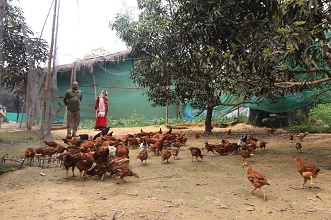Backyard Poultry Production and its Management
Anchal Keshri, R.K.Jain, Ashok Kumar Patil, Naresh Kurechiya, Dimpee Singh, Akhelesh Kumar karosiya , S.Navaneetha Krishnan and Anshika Tiwari
Introduction
Livestock and poultry sector provide a major contribution to India’s economy. In poultry sector impressive growth has been achieved in the intensive poultry farming in India, but the rural poultry sector remained stagnant. To meet the growing demand of population and per capita consumption in rural /tribal area, backyard poultry farming is best alternative in rural/tribal area. Backyard poultry is characterized by small flocks with low biosecurity measures and poultry raised by a family or in a household in rural areas. Backyard flocks represent around 80% of poultry stocks in many developing countries. Indigenous unselected breeds of various ages, with various species mixed in the same flock are used for backyard poultry. Due to their low productivity (annual egg production: 50-60 nos.), their contribution to the total egg output was almost static for the last few decades. Therefore, the consumption of eggs in rural areas is far below the national average egg consumption. Increasing the genetic potential of the local native chicken varieties greatly helps in increasing the availability of poultry meat and eggs in rural areas. The rural varieties Vanaraja (Dual) and Gramapriya (Layer) are popular among rural/tribal women as income generating source.
Advantages of backyard poultry farming
- a) Alleviates protein malnutrition in pregnant women, feeding mothers and children.
- b) Waste material (insects, ants, fallen grains, green grass, kitchen waste, vegetable waste etc.) can be efficiently converted into egg and meat for human consumption.
- c) Provides additional income to the rural households. Generate employment opportunity in rural areas and help in checking migration of people to urban areas.
- d) Backyard poultry farming integrates well with other agricultural operations.
- e) Aids in enhancing the soil fertility in backyards.
- f) Eggs and meat from birds reared under free range conditions have low cholesterol concentration compared to intensive poultry farming.
Management of backyard poultry
For egg production, these birds can be reared in small numbers (10-20) in free range conditions. They can be reared in large number under intensive/ semi-intensive conditions for meat purpose by providing all inputs similar to commercial broilers. These birds need to be reared up to 6 weeks under proper nursery management and after 6 weeks of age, they may be released in free range.
Management under free range system
At 42 days of age, backyard poultry birds especially, Vanaraja and Gramapriya are ready to keep in free range system. Depending upon the housing area and natural feed base available, these birds can be let out under backyard free- range conditions (10-20 birds/ household). These birds are let loose for foraging during day time but require shelter at night time. Clean drinking water should be available.
Feeding management
Once learn to scavenge in the household surrounding, backyard poultry birds can easily pick up its food from backyards. Under free-range conditions, they scavenge on vegetation, waste grains, insects, grass seeds etc. available in the backyards. Generally, the birds can meet their protein requirement through scavenging but the possibility of energy deficiency is common under free-range conditions. Therefore, to sustain the production, feeding the birds with different locally available cereals (like maize, bajra, jowar, broken rice with equal parts of rice polish or rice bran) is always beneficial.
Health management
Newcastle (Ranikhet) disease is most important disease that affects birds under free range farming. Night shelter should have good ventilation, adequate light and protection from predators. The materials used for night shelter offer a good hiding place for external parasites. Therefore, periodic cleaning of night shelter is essential. Deworming should be done at 2-3 months interval. Before the onset of summer, adult birds should be vaccinated against Newcastle disease at 6 months interval, under free-range conditions. Vaccination of native birds along with Vanaraja/ Gramapriya is recommended.
Conclusion
The backyard poultry farming with improved varieties of birds provide a better livelihood security to the poor farmers, provide additional income generation potential, better eggs and meat quality in rural areas.


